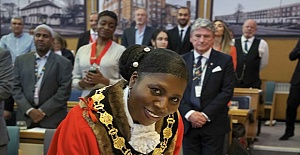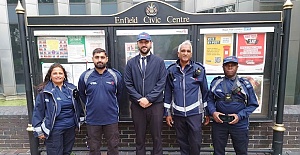And two-thirds of girls say they have experienced unwanted sexual attention in public, it adds.
The figures come from a report by children's charity Plan International UK, which said many girls feel street harassment is "all part of growing up".
It is calling on bystanders to challenge harassment when they see it.
The report surveyed more than 1,000 teenagers and young women aged 14 to 21, and also carried out interviews with girls and academics.
It found:
- 66% of girls in the UK said they had experienced unwanted sexual attention or sexual or physical contact in a public place
- 35% of girls reported receiving unwanted sexual contact such as being touched, groped or grabbed
- Girls as young as eight years old described witnessing or experiencing harassment
- More than one in three girls received unwanted sexual attention such as being groped, stared at, catcalled and wolf-whistled while wearing school uniform
- One-quarter of girls said they had been filmed or photographed by a stranger without permission
The report features stories from several young women, including 19-year-old Malikah, from Birmingham, who said she was followed by someone in a car while walking alone.
"My phone was upside-down, but I pretended to be on the phone and was trying to make out like my dad was coming to pick me up," she said.
"Now my parents are more cautious about when I'll be home and going out after dark."
One 18-year-old said she felt street harassment was "part of the 'bro culture'" and her dad had told her: "You know what men are like."
And another girl, aged 17, said: "It's just become normal."
What to do if you are harassed?
Hollaback! - an international movement tackling harassment - says there is no right or wrong way to respond.
But if you choose to speak directly to the assailant, it offers the following advice:
1. Be firm: Look them in the eye and denounce their behaviour with a strong, clear voice.
2. Say what feels natural: The important thing is that you are not apologetic in your response.
3. Don't engage: Harassers may try to argue with you or dismiss you through further conversation or by making fun of you. As tempting as it may be get into a verbal war with them, it is not recommended. The attention may further feed their abusive behaviour.
4. Keep moving: Once you've said your piece, keep moving. Harassers do not deserve the pleasure of your company.
The charity is calling on the government to recognise street harassment as a type of "gender-based violence".
It has made several recommendations, including:
- Public awareness campaigns to spread the message that street harassment "is not OK"
- Offer training for bystanders on how to safely intervene
- Support boys and men to change their attitudes and challenge harassment
- Provide relationship and sex education to young people
- Training for workers in public places (shop staff, bus drivers) on spotting harassment and reporting it
The chief executive of Plan International UK, Tanya Barron, said it was "shocking and deeply concerning" that girls who are clearly of school age are being sexually harassed.
"It's simply not acceptable that girls as young as 12 are being wolf-whistled at in public, touched against their will, stared at or even followed," she said.
"This disgraceful behaviour needs to be called out and stopped."
BBC NEWS


 CTCA UK Condemns the Political Forcing Out of Afzal Khan MP for Engaging with Turkish Cypriots
CTCA UK Condemns the Political Forcing Out of Afzal Khan MP for Engaging with Turkish Cypriots Tatar: “Reaction to MP’s TRNC visit is yet another stark example of the Greek Cypriot leadership’s primitive and domineering mentality”
Tatar: “Reaction to MP’s TRNC visit is yet another stark example of the Greek Cypriot leadership’s primitive and domineering mentality” Margaret Greer has been sworn in as the new Mayor of Enfield
Margaret Greer has been sworn in as the new Mayor of Enfield Prime Minister Keir Starmer's 2025 Easter message
Prime Minister Keir Starmer's 2025 Easter message Team Enfield ranks fifteenth the in London Youth Games
Team Enfield ranks fifteenth the in London Youth Games Parking enforcement boosted with more officers on patrol in Enfield
Parking enforcement boosted with more officers on patrol in Enfield Ersin Tatar meets with President Erdoğan
Ersin Tatar meets with President Erdoğan President Ersin Tatar Holds Ministerial-Level Meeting with UK Minister for Europe
President Ersin Tatar Holds Ministerial-Level Meeting with UK Minister for Europe UEFA Europa League and UEFA Conference League draws to be combined into one single show
UEFA Europa League and UEFA Conference League draws to be combined into one single show EuroLeague schedule for 2025-26 season announced
EuroLeague schedule for 2025-26 season announced Zeynep Sonmez becomes first Turkish tennis player to reach third round at Wimbledon
Zeynep Sonmez becomes first Turkish tennis player to reach third round at Wimbledon European champions Arsenal Women will play all of their league matches at the Emirates Stadium
European champions Arsenal Women will play all of their league matches at the Emirates Stadium Enfield Labour welcomes the completion of A10 average speed cameras extension.
Enfield Labour welcomes the completion of A10 average speed cameras extension. TfL opens 2025 grants for community groups to encourage more walking, cycling and active travel in the capital
TfL opens 2025 grants for community groups to encourage more walking, cycling and active travel in the capital Fethiye Launches International Digital Tourism Campaign with UK-Based Publisher
Fethiye Launches International Digital Tourism Campaign with UK-Based Publisher Highlights from the 3rd Trans-Caspian Connectivity Conference in London
Highlights from the 3rd Trans-Caspian Connectivity Conference in London















